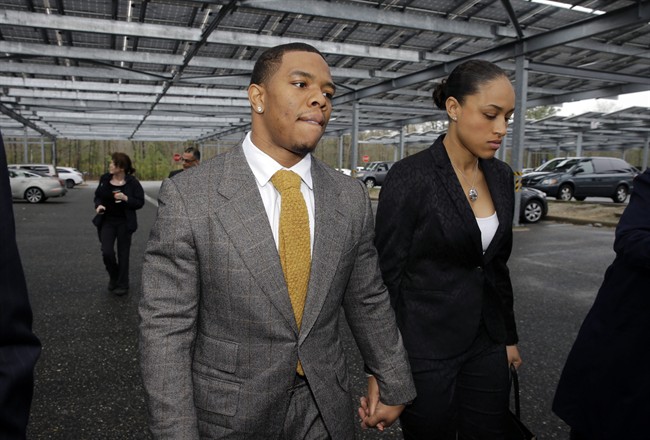TORONTO – On Monday disturbing video of former Baltimore Ravens running back Ray Rice knocking out his then-fiancee in a hotel elevator sent shockwaves through the sports world.

Hours after the video was released Rice was suspended indefinitely by the NFL and released by the Ravens. – a drastic escalation from the initial two-game suspension he was handed by the league after initial video of the February incident showed him dragging an unconscious Janay Palmer (now Janay Rice) from the elevator.
WATCH: Why Canada still has a long way to go in tackling domestic abuse
”What we have to do is go back and say, ‘If we have one case, that’s something we’ve got to address. If we have multiple cases, we have to change our training and our education to try and eliminate that issue,'” he said.
Looking back over the last 14 years in the NFL it appears the Ray Rice incident is not an isolated case but an example of a long history of domestic abuse and violence against women in the NFL.
Querying the San Diego Union-Tribune database of NFL arrest records from 2000 onwards reveals 24 of 32 teams had employed a player who had been charged with domestic violence or sexual assault.
Rice’s suspension raises questions about how Goodell and the NFL might handle the cases of Carolina Panthers defensive end Greg Hardy and San Francisco 49ers defensive tackle Ray McDonald, who were both arrested on assault charges.
Hardy was found guilty two counts and handed a 60-day suspended sentence but is appealing his conviction, while McDonald’s case is still before the court.
In the opening week of the NFL season both players were on the field. Hardy recorded four tackles and sack in Carolina’s opening win against Tampa Bay; McDonald tallied three tackles in a win against Dallas.
WATCH: Roger Goodell won’t ‘rule out’ Ray Rice playing again in the NFL
Both teams have said they will let the cases play out in court before taking disciplinary measures.
Gordon Kirke, an adjunct professor of sports law at the University of Toronto, said the Rice case will be a watershed moment in how the NFL deals with domestic violence.
“Here you have defining evidence, so you can take a very strong stance against spousal abuse,” said Kirke. “Clearly the message to the league is that previous punishments haven’t been a deterrent. Now players will think two or three times before doing it.”
Kirke added that domestic cases can be problematic to prosecute based on “he said, she said” evidence or the victim dropping the charges altogether.
READ MORE: Janay Rice defends her husband, suspended NFL running back Ray Rice
Following the backlash from Rice’s initial two-game suspension, Goodell sent an open letter to team owners in August admitting “I didn’t get it right. Simply put, we have to do better. And we will.”
Goodell’s revised NFL disciplinary policy for domestic violence now warrants a six-game suspension for a first-time offence and up to a lifetime ban for repeat offenders.
But Layth Gafoor, a managing partner at Lucentem sports and entertainment law, says the wording of the new policy is problematic.
“The policy itself is not really clear on what ‘offence’ means. Is it a conviction? Is it an accusation? Is it a guilty plea?” he said. “Having done this for a long time it is deliberately vague as to what that means.”
Gafoor added the Rice case points to a disconnect in how the public views domestic abuse versus how cases are handled in the court system.
“The New Jersey prosecutor’s office saw that information, they had the video, and still opted to deal with this matter by way of a diversion,” he said. “And this is what we see happening every single day in in criminal courts across North America… most of them for first time offenders are dealt with in the way Mr. Rice was dealt with.”




Comments